
Namie Amuro is a retired Japanese singer. She rose to prominence as a teen idol, and transitioned into a leading pop artist due to her versatility across music styles and visual presentation. Due to her career reinventions and longevity, she is known as an icon across Japan and Asia. She has been referred to as the "Queen of Japanese Pop", and her influence domestically has drawn equivalent comparisons to artists such as Janet Jackson and Madonna in Western pop culture.
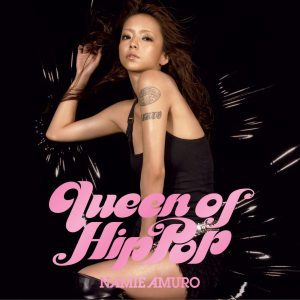
Queen of Hip-Pop is the seventh studio album by Japanese recording artist Namie Amuro. It was released on July 13, 2005, by Avex Trax. The album's lyrical content, composing and arrangement was handled by multiple music collaborators, such as Nao'ymt, Sugi-V, Michico, Tricky Stewart, T.Kura, among many others. It is her second full-length urban contemporary record, and is made up of songs of various musical genres. Amuro uses the term "hip-pop" to describe the music on the album because it fuses pop music with other genres including R&B and hip-hop music. Three different formats were released to promote the album: a standalone CD, a limited edition Playbutton, and a digital download.

"Want Me, Want Me" is the 29th single by Japanese recording artist Namie Amuro. It was released by Avex Trax on April 6, 2005, and was the last retailed single to precede her seventh studio album, Queen of Hip-Pop (2005). "Want Me, Want Me" was initially supposed to be released as an album track of Queen of Hip-Pop or a coupling song, but Amuro thought it was so good she made it a single despite the opposition of her staff. The song's lyrics were written by Michico, while its music was composed by Sugi-V. Musically, "Want Me, Want Me" is an upbeat reggae-style tune with an addictive loop that incorporates Japanese elements like the koto that plays during the intro. Atypical for Amuro, the song contains sexually aggressive lyrics and namechecks the condom brand Trojan in the chorus.

"White Light" is a song by Japanese singer Namie Amuro. It was released by Avex Trax in Japan on November 16, 2005, as a double A-single with "Violet Sauce". "White Light" was supposed to promote Amuro's eighth studio album Play (2007), but it was scrapped from the final track list. Instead, an alternative version of "Violet Sauce" appeared. A demo version of the song was sent to Amuro, who decided it needed a warmer tone and reworked it as a Christmas song. It was modified by Nao'ymt, the song's sole composer, producer, and writer. Musically, it's a midtempo Christmas song with lyrics about love and holiday festivities.
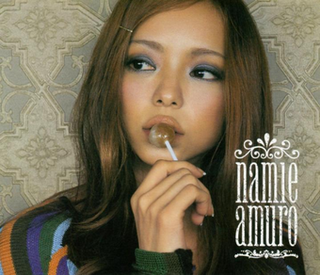
"Girl Talk" is a song by Japanese singer Namie Amuro. Avex Trax released it on digital and physical formats on October 14, 2004, and it is the third single from Amuro's seventh studio album, Queen of Hip-Pop (2005). It was also released as a double A-side with "The Speed Star", though the latter did not appear on the parent album. "Girl Talk" was written and produced by T.Kura and Michico, and is a dance song with R&B and pop influences that, like its parent album, transitions from Amuro's original dance sound to a more mature yet transatlantic sound.
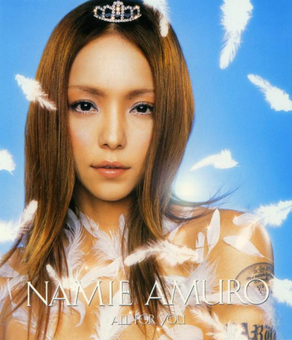
"All for You" is the 27th single by Japanese recording artist Namie Amuro. It was released on July 22, 2004, by Avex Trax, and serves as Amuro's second single from her seventh studio album Queen of Hip-Pop (2005). The lyrics were written by Natsumi Watanabe, who had translated "Stop the music" into Japanese for Amuro's 1995 single. The music was composed by Ryoki Matsumoto, known for composing other hit songs such as RUI's "Tsuki no Shizuku" and Mika Nakashima's "Yuki no Hana." Musically, "All For You" is a synthesizer-heavy power ballad.
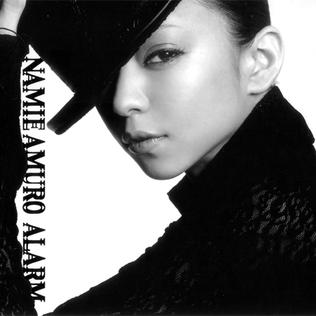
"Alarm" is the 26th single by Japanese recording artist Namie Amuro. It was released by Avex Trax on March 17, 2004, serving as the lead single to Amuro's seventh studio album Queen of Hip-Pop (2005). The song was written by Jusme and composed by Monk. The B-side "Strobe" was first planned as the main track of this single and when Amuro got the demo for "Alarm" the song was titled "Clock."

"Can't Sleep, Can't Eat, I'm Sick" is the 31st single by Japanese singer Namie Amuro. It was released by Avex Trax in Japan alongside "Ningyo" on May 17, 2006, as a double A-single. "Can't Sleep, Can't Eat, I'm Sick" served as the second single from Amuro's eighth studio album Play (2007), but "Ningyo" was excluded from the track list. "Can't Sleep, Can't Eat, I'm Sick" was produced by her two most frequent collaborators at the time: T.Kura and Michico for Giant Swing Productions. Musically, it is an upbeat urban contemporary and dance pop song that features a hefty amount of saxophones. Lyrically, it speaks of a lovesick person who can't get anything done when he or she thinks about their lover.

181920 is debut greatest hits album by Japanese singer Namie Amuro. Avex Trax released it in Japan on January 28, 1998, and it was later available in a variety of formats throughout Asia. The album contains Amuro's single releases from her debut studio album Dance Tracks Vol. 1 (1995) to her third album Concentration 20 (1997), as well as three tracks from her time with Toshiba-EMI. The album also included a new song called "Dreaming I Was Dreaming," which served as the only single from the album.

"Put ‘Em Up" is the 24th single by Japanese singer Namie Amuro. It was released on digital and physical formats by Avex Trax on July 16, 2003, and serves as Amuro's third single from her sixth studio album Style (2003). It was originally written by Jasper Cameron and producer Dallas Austin, but portions of it were rewritten by Japanese songwriter Michico because Amuro felt the demo version was too harsh.

"Shine More" is the 23rd single by Japanese recording artist Namie Amuro. It was released on March 5, 2003, by Avex Trax and serves as the second single from her sixth studio album Style (2003). It was originally written by Scott Nickoley, Sandra Pires and Paul Taylor, while the lyrics were translated into Japanese by H.U.B. Amuro called "Shine More" the first part of a dance number trilogy including "Put 'Em Up" and "So Crazy."

"Say the Word" is the 18th single by Japanese recording artist Namie Amuro, and her 7th vinyl record. The CD single was released on August 8, 2001, by Avex Trax. The vinyl edition was released on September 12, 2001, by Rhythm Republic. This is Amuro's first single since severing ties with her former long-time producer Tetsuya Komuro. The song is not found on any of her studio records, but was later placed on her second best album Love Enhanced Single Collection, which was released five months later. It was produced by Swedish producers Ronald Malmberg and Thomas Johansson who are best known for their work with Swedish pop group A-Teens.
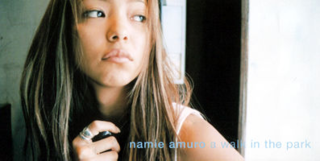
"A Walk in the Park" is the eighth single by Japanese recording artist Namie Amuro from her third studio album Concentration 20 (1997). The song was released as the album's lead single on November 27, 1996, by Avex Trax. It was written, composed and produced by Tetsuya Komuro. The song is an electronic rock track, which features instrumentation from guitars, synthesizers, organs, keyboards and drums. Lyrically, it explores themes of loneliness, longing, and the desire for connection.
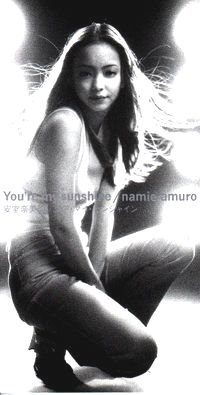
"You're My Sunshine" is the sixth single by Japanese singer Namie Amuro. It was released on June 5, 1996, by Avex Trax and was produced by Tetsuya Komuro. The song was the image song for the Bristol-Myers Squibb "Sea Breeze '96" commercial in which she appeared. The version used in the initial commercial had a different tempo and tune from the CD package version. The following year, 1997, she was used for the second consecutive year in a "Sea Breeze" commercial, this time using her hit song "How to Be a Girl".

"Never End" is the 17th single by Japanese recording artist Namie Amuro. It was released on July 12, 2000, as the lead single from her fifth studio album Break the Rules (2000). The track was made specifically for the 26th G8 summit that took place in Amuro's home prefecture Okinawa during July of that year. "Never End" was written, composed and arranged solely by her long-time producer Tetsuya Komuro. Musically, it is a pop ballad that takes influences from Okinawan music. Lyrically, the song describes distant memories, distant places, and distant emotions, indicating a longing for connection and understanding.

"Something ‘Bout the Kiss" is a song by Japanese singer Namie Amuro. It was released on September 1, 1999 by Avex Trax, and serves as the third single from her fourth studio album Genius 2000 (2000). Furthermore, all physical and digital formats included an additional B-side called "You Are the One", which appears on the parent album. "Something 'Bout the Kiss" was written by Lysette Titi, Chan Hai, and its producer Dallas Austin. Musically, it is a midtempo contemporary R&B track with a melancholic melody.

"Baby Don't Cry" is the 32nd single by Japanese recording artist Namie Amuro. It was released as the second single from her eighth studio album, Play (2007). It was written, composed, arranged, and produced by Japanese musician Naoaki Yamato, under the alias Nao'ymt. The single also included the B-side track "Nobody," a reworked version of her 2005 song "White Light." "Baby Don't Cry" premiered on January 24, 2007, as the third single from the album in Japan. It was also released worldwide on February 21, 2007, through Avex Inc. Musically, "Baby Don't Cry" is an mid-tempo sunshine pop song influenced by R&B music.

Play is the eighth studio album by Japanese recording artist Namie Amuro. It was released on June 27, 2007, by Avex Trax and was made available in both physical and digital formats. Following the success of her previous album, Queen of Hip-Pop (2005), Amuro enlisted long-time collaborators Nao'ymt and T. Kura to produce the album. Play, like its predecessor, is an urban contemporary record with elements of pop music, rock and dance-pop. Lyrically, the record explores themes of love, frustration, and relationships.

Best Fiction is the third greatest hits album by Japanese singer Namie Amuro. It was released on July 30, 2008, by Avex Trax and features seventeen singles released between 2002-2008, which included five new songs, three of which were released as a triple A-side single called "60s 70s 80s." Furthermore, the album tracks "Do Me More" and "Sexy Girl" were released as digital singles.

"Wild" is a song by Japanese singer Namie Amuro. It was released by Avex Trax on March 16, 2009, and serves as the lead single for her ninth studio album, Past<Future (2009). Furthermore, all physical and digital formats included the A-side titled "Dr.," which appears on the parent album. Amuro intended to depart from her previous releases with "Wild" and "Dr.", her first forays into new material. Michico, T. Kura, and Nao'ymt created and produced "Wild," which was recorded at Tokyo's Azabu-O-Studio with Ryosuke Kataoka's assistance.





















